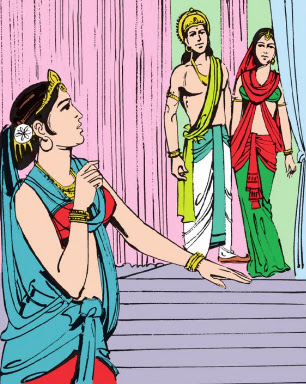CHAPTER CLXV
(PRADYUMNA GOES TO DWARAKA AND HIS PARENTS RECOGNIZE HIM)
Vaishampāyana said:—Having celebrated his sacrifice the powerful Māyāvin Shamvara was killed in battle on the eighth day of a fortnight (1). Having slain that foremost of Asuras in the city of Rikshavanta Pradyumna, taking Māyāvati with him, set out for his father's city (2). By his illusory powers the quick-coursing hero rose up into the welkin and reached the charming city of Dwāravati protected by his father's power (3). That young man, beautiful like Manmatha (Cupid), descended from the sky with Māyāvati at the inner appartment of Keshava (4). When Pradyumna thus came down Keshava's queens were all filled with surprise, joy and fear (5). Afterwards seeing that young man, resembling Kāma himself, with his wife, their faces grew delighted; and they, with their eyes, as if drank his ambrosial beauty (6). Beholding the bashful countenance of that boy and him filled with shame at every step Krishna's wives were all at their wit’s end (7). Beholding that boy, Rukshmini, the mother of a son, encircled by her hundred co-wives, was striken with sorrow. And shedding tears she said:—"Alas! I saw in a mid-night dream that the slayer of Kansa had given me mango leaves. Keshava took me on his lap and put a garland of pearls resembling the rays of the moon around my neck. A youthful lady, with beautiful curling hairs, clad in a white raiment and with a lotus in her hand, entered into my room. And she sprinkled me with beautiful water. Afterwards that lady touched my head with her hands and gave me a garland of lotuses." Having thus described her dream, Rukshmini, encircled by her female friends, cast her looks again and again on the prince and said:—"Blessed is that woman whose son is such a beautiful, long-lived boy resembling Kāma and just ushered into the first stage of youth. O son, what lucky woman has been blessed with a son like yourself black like clouds Why have you come here with your wife? Alas, if the powerful Death had not carried him away my baby Pradyumna would have been of this age by this time. My surmise can never be untrue. Forsooth you are a prince of the Vrishni family; from the marks of your body you look like Janārddana without his discus. Your face and hairs resemble those of Nārāyana and your thighs, arms and breast resemble those of my father-in-law and Haladhara. Alas, you look like the second celestial body of Nārāyana. With your person you have adorned the entire Vrishni race. Who are you, O my child?"
In the meantime Krishna all on a sudden entered there hearing from Nārada of the destruction of Shamvara (8-20). Beholding his eldest son there, along with his daughter-in-law Māyāvati resembling Cupid himself, Janārddana was filled with joy and said to the goddess-like Rukshmini: "O goddess, here is your son the great bow-man. He has killed Shamvara, an expert of illusion and has learnt all his illusory arts by which he used to torment the gods. This auspicious and chaste lady is the wife of your son. She was up to this time living in Shamvara's house under the name of Māyāvati. Do not distress your mind thinking her as the wife of Shamvara. Know her as Rati, the beloved consort of Kāma. Formerly when Manmatha became limbless being consumed by Harā's fiery anger this auspicious lady, up to this time, always kept that Daitya infatuated with her likeness made by her illusory powers. Even in her youth this beautiful lady did not seek Shamvara; creating her own like-ness by her illusory powers she used to send her to Shamvara. O fair lady, this my son's wife, and your daughter-in-law will help Kāma and please him, She is our eldest daughter-in-law and deserves our affection. Take her to your room and nourish your lost son who has come back" (21–29).
Vaishampāyana said:—Hearing those words given vent to by Krishna Rukshmini attained to an excess of delight and said:—"Most fortunate am I since my heroic son has come back again. Blessed is my birth and I have achieved my object since my lost son has returned with his beloved wife. Come my son and enter this room with your wife." Thereupon having saluted his mother and Govinda Pradyumna bowed unto Haladhara. Thereupon raising up Pradyumna the foremost of the powerful Keshava, the slayer of enemy's warriors, embraced him and smelt his head. The goddess Rukshmini too, with words suppressed with affection, raised up her daughter-in-law adorned with gold, placed her on her lap and embraced her. Thereupon as Aditi conducts the king of gods with Sachi into her own room so Rukshmini took her son who had returned with his wife to her own room (30-36).
Source: https://archive.org/details/AProseEnglishTranslationOfHarivamsh
| Previous | | Source | | Tamil Translation | | Next |
